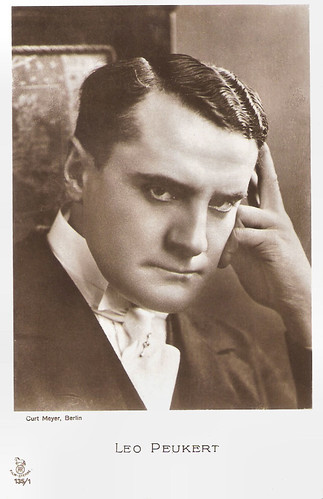
German postcard by Rotophot in the Film Sterne series, no. 135/1. Photo: Curt Meyer, Berlin.
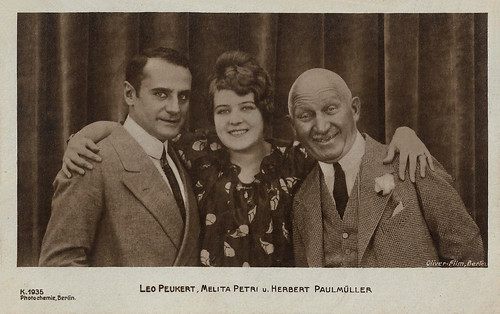
German postcard by Photochemie, Berlin, no. K.1935. Photo: Oliver-Film, Berlin. Leo Peukert, Melitta Petri and Herbert Paul Müller.
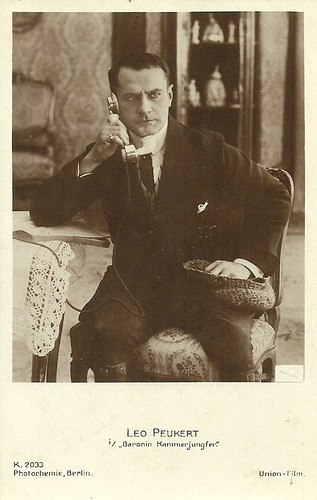
German postcard by Photochemie, Berlin, no. K.2033. Photo: Union-Film. Leo Peukert in Baronin Kammerjungfer (Leo Peukert, 1918).
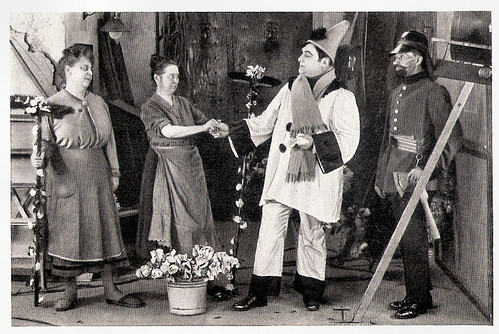
German collectors card by Ross Verlag in the series Vom Werden Deutscher Filmkunst - Der Stumme Film, no. 39, group 41. Photo: Ufa. Publicity still for Lohengrin's Heirat/Lohengrin's marriage (Leo Peukert, 1922).
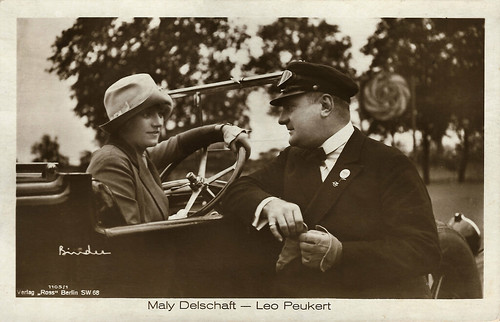
German postcard by Ross Verlag, Berlin, no. 1105/1, 1927-1928. Photo: Alex Binder. Leo Peukert and Maly Delschaft.
Leo Saperloter
Leonhard ‘Leo’ Peukert was born in 1885 in Munich, German Empire.
He began his acting career on stage at the Vereinigten Theatern (United theatres) in Munich, from 1904 to 1908. In 1909 he moved to the Berliner Lustspielhaus and there he was discovered for the cinema.
In 1910, he started his film career with the early silent film Pro Patria (Charles Decroix, 1910). He soon became a very busy film actor and starred for BB-Film-Fabrikation in such shorts as Leo und seine drei Bräute/Leo and his three brides (Heinrich Bolten-Baeckers, 1911), Leo Saperloter (Heinrich Bolten-Baeckers, 1911), Leo als Witwenfreund/Leo as a widow friend (Carl Wilhelm, 1912), Leo, der schwarze Münchhausen/Leo, the black Münchhausen (Carl Wilhelm, 1913) and Leo, der Aushilfskellner/Leo, the temporary waiter (Leo Peukert, 1913).
Between 1913 and 1927 he directed 12 silent films for BB-Film-Fabrikation in Berlin. He played the male lead opposite the legendary Asta Nielsen in the dramas Heißes Blut/Hot blood (Urban Gad, 1911) and Die arme Jenny/Poor Jenny (Urban Gad, 1912).
He also appeared in three versions of the comedy Mein Leopold/My Leopold (1914, 1919, 1924) all directed by Heinrich Bolten-Baeckers and based on the 1873 play Mein Leopold by Adolphe L'Arronge. Peukert also appeared in another L’Arronge adaptation, Hasemanns Töchter/Hasemann's Daughters (Heinrich Bolten-Baeckers, 1920) with Sabine Impekoven. Peukert and Impekoven were married in 1914 and appeared together in several silent films.
For director Bolten-Baeckers, Peukert also appeared in the comedy Die zweite Mutter/The Second Mother (Heinrich Bolten-Baeckers, 1925) starring Margarete Lanner and Hans Mierendorff. These popular comedies were released by UFA alongside its more prestigious art films.
Peukert only occasionally played a leading role in his films. A rare example is the comedy Die Fahrt ins Glück/The Happy Journey (Heinrich Bolten-Baeckers, 1923). Mostly he appeared as a character actor, such as in the silent comedies Funkzauber/Radio Magic (Richard Oswald, 1927) starring Werner Krauss, Xenia Desni and Fern Andra, and Mikosch rückt ein/Mikosch Comes In (Rolf Randolf, 1928) starring Gyula Szőreghy, Lydia Potechina and Claire Rommer.
Peukert played more leading roles in the comedy Ein besserer Herr/A Better Master (Gustav Ucicky, 1928) with Lydia Potechina as his wife and Willi Forst as his son, and Ich hatte einst ein schönes Vaterland/I Once Had a Beautiful Homeland (Max Mack, 1928) with Grete Reinwald as his daughter.

German postcard. Photo: Alex Binder.
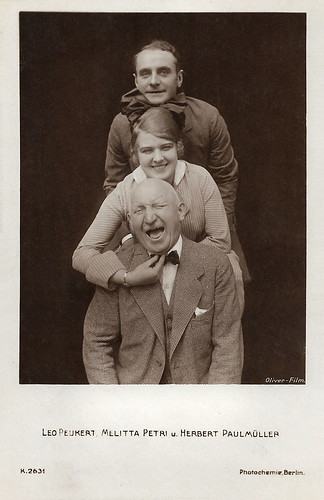
German postcard by Photochemie, Berlin, no. K.2631. Photo: Oliver-Film, Berlin. Leo Peukert, Melitta Petri and Herbert Paul Müller.
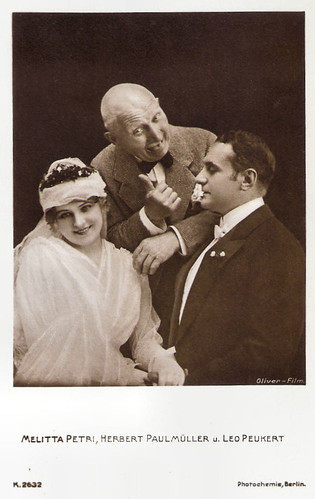
German postcard by Photochemie, Berlin, no. K.2632. Photo: Oliver-Film, Berlin. Leo Peukert, Melitta Petri and Herbert Paul Müller.

German postcard by Photochemie, Berlin, no. K.2633. Photo: Oliver-Film, Berlin. Leo Peukert, Melita Petri, and Herbert Paulmüller. Peukert, Petri and Paulmüller often played together but only a few times at Oliver-Film, in Resemanns Brautfahrt (1918), Der müde Theodor (1918), Logierbesuch in der Sommernacht (1918), sometimes in coproduction with BB-Filmfabrikation such as Wenn der Bräutigam mit der Braut (1919), and Die blonden Mädels vom Lindenhof (1918).
Playing wine merchants, editors, and fathers
During the 1930s, Leo Peukert continued successfully into sound films and played key supporting roles in films of the 1930s and early 1940s. Often cast as senior civic leaders, theatrical directors, wine merchants, editors, and fathers.
A major hit was the farce Drei Tage Mittelarrest/Three Days Confined to Barracks (Carl Boese, 1930) starring Max Adalbert, Ida Wüst and Gretl Theimer. The film is set around a military barracks.
Another hit was the sound version of the comedy Kohlhiesels Töchter/Kohlhiesel's Daughters (Hans Behrendt, 1930), in which he played the father of Henny Porten in a double role. The significant success at the box office established Porten as a sound star.
In the early 1930s followed comedies like Moritz macht sein Glück/Moritz Makes his Fortune (Jaap Speyer, 1931) starring Sig Arno, and Die schönen Tage von Aranjuez/Happy Days in Aranjuez (Johannes Meyer, 1933) starring Brigitte Helm.
He played a vet in the rural comedy Alles weg'n dem Hund/All Because of the Dog (Fred Sauer, 1935) starring Weiß Ferdl and Julia Serda. He also appeared in comedies like Die Umwege des schönen Karl/The Roundabouts of Handsome Karl (Carl Froelich, 1938) starring Heinz Rühmann, Ein hoffnungsloser Fall/A Hopeless Case (Erich Engel, 1939) as the father of Jenny Jugo, and Das Ekel/The Scoundrel (Hans Deppe, 1939) starring Hans Moser. He had a bigger role in the comedy Links der Isar - rechts der Spree/Left of the Isar, Right of the Spree (Paul May, 1940) with Fritz Kampers.
Prestigious was the musical comedy Frauen sind doch bessere Diplomaten/Women Are Better Diplomats (Georg Jacoby, 1941) starring Marika Rökk and Willy Fritsch. The film was the first German feature film to be made in colour, and was one of the most expensive films produced during the Third Reich. The film was among the most popular German films of the early war years.
Another hit was Quax, der Bruchpilot/Quax the Crash Pilot (Kurt Hoffmann, 1941) starring Heinz Rühmann. Later films include the operetta Maske in Blau/Mask in Blue (Paul Martin, 1943) with Clara Tabody, the melodrama Damals/Back Then (Rolf Hansen, 1943) starring Zarah Leander, and the historical drama Romanze in Moll/Romance in a Minor Key (Helmut Käutner, 1943) with Marianne Hoppe.
His final film was Ein schöner Tag/A beautiful day (Philipp Lothar Mayring, 1944), shot in the summer of 1943. Leo Peukert died in January 1944 in Tiengen on the Upper Rhine (now Waldshut-Tiengen), Germany. He was 58.
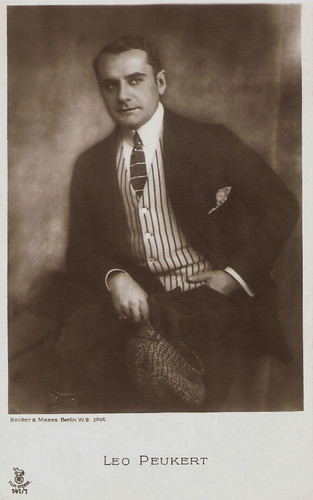
German postcard in the Film Sterne series by Rotophot, no. 141/1. Photo: Becker & Maass, Berlin.
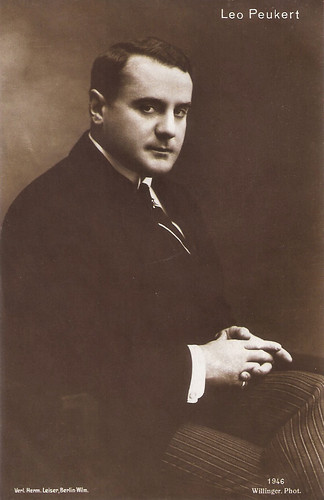
German postcard by Verlag Herm. Leiser, Berlin-Wilm., no. 1946. Photo: Willinger.
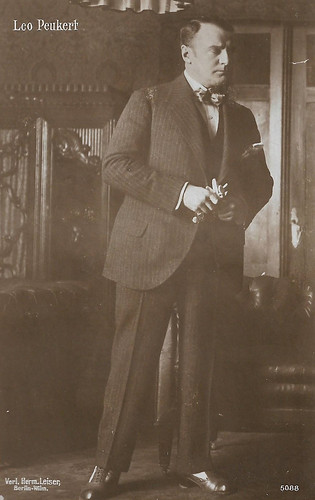
German postcard by Verlag Hermann Leiser, Berlin-Wilm., no. 5088.

German promotion card for Bubisan by Kosmasept-Gesellschaft Dr. Fürstenberg m.b.H., Berlin, 1930. Caption: Keine Frisur ohne Bubisan! (No hairstyle without Bubisan). Bubisan fest was a brilliantine for the hair.
Sources: Stephanie D’heil (Steffi-Line – German), Filmportal.de, Wikipedia (German and English), and IMDb.
This post was last updated on 4 September 2022.
No comments:
Post a Comment